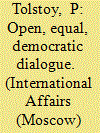| Srl | Item |
| 1 |
ID:
180729


|
|
|
|
|
| Summary/Abstract |
IN THE SUMMER OF 2019, an event took place that we had been waiting for for several years: Russia returned to the Parliamentary Assembly of the Council of Europe, and the rights of the Russian delegation were fully restored.
|
|
|
|
|
|
|
|
|
|
|
|
|
|
|
|
| 2 |
ID:
148668


|
|
|
|
|
| Summary/Abstract |
The important role of young people in building peace and challenging violent extremism is gaining recognition within the international community. The United Nations Security Resolution on Youth, Peace, and Security (SCR 2250), passed in December 2015, is evidence of this trend. It represents a shift from the dichotomy of youth as either perpetrators or victims of violence to a perspective in which youth are viewed as agents of positive change and peace. In moving forward with this resolution and similarly reflective and supportive policy, one of the greatest challenges for the Middle East and North Africa will be the current geopolitical context and obstacles to opportunity. In a region fraught with conflict, stemming from domestic and foreign policies, as well as a history of unrepresentative and repressive governance systems, leaders have often sought to maintain the status quo. This is a problem in a region where more than 30 percent of the population is between 15 and 29 years of age, and are increasingly frustrated with and stymied by a lack of meaningful political space—leading to lost faith in political systems.1 In such a setting, regional policymakers must be challenged to meaningfully incorporate young people into decisionmaking processes, to ensure that peacebuilding programs target young people early on in their development, to avoid the securitization of youth in the development and implementation of national and local policies, and to address the underlying social, economic, and political grievances that often drive extremism and impact young people’s relationships with their communities and states.
|
|
|
|
|
|
|
|
|
|
|
|
|
|
|
|